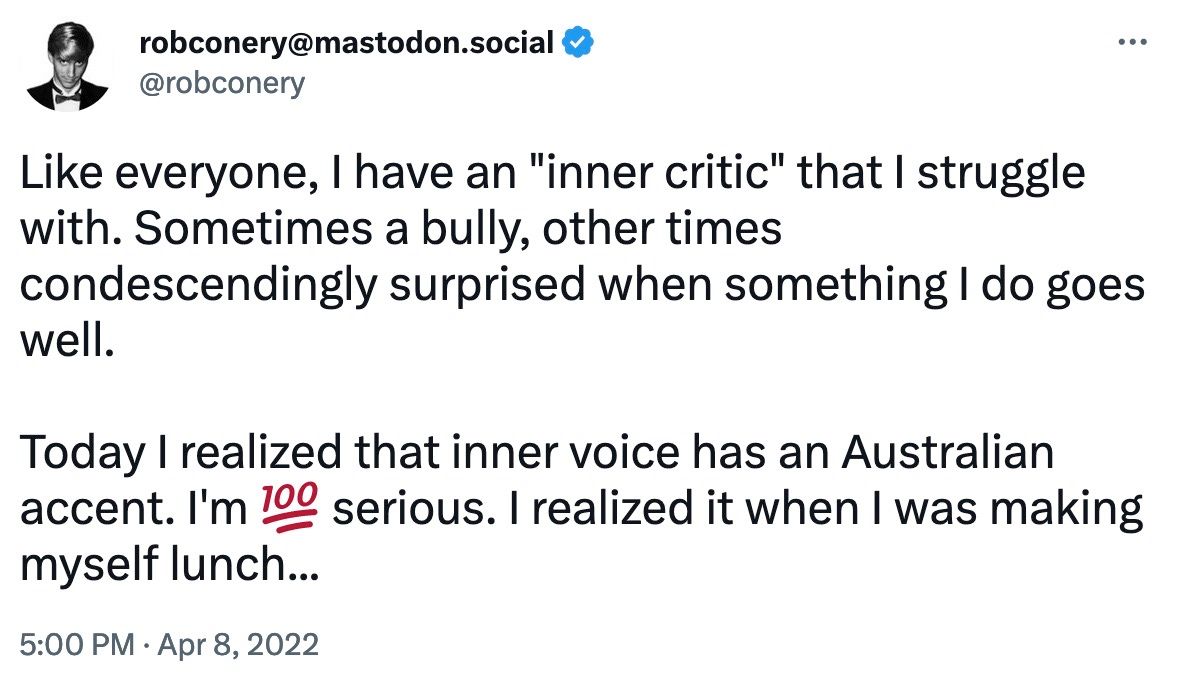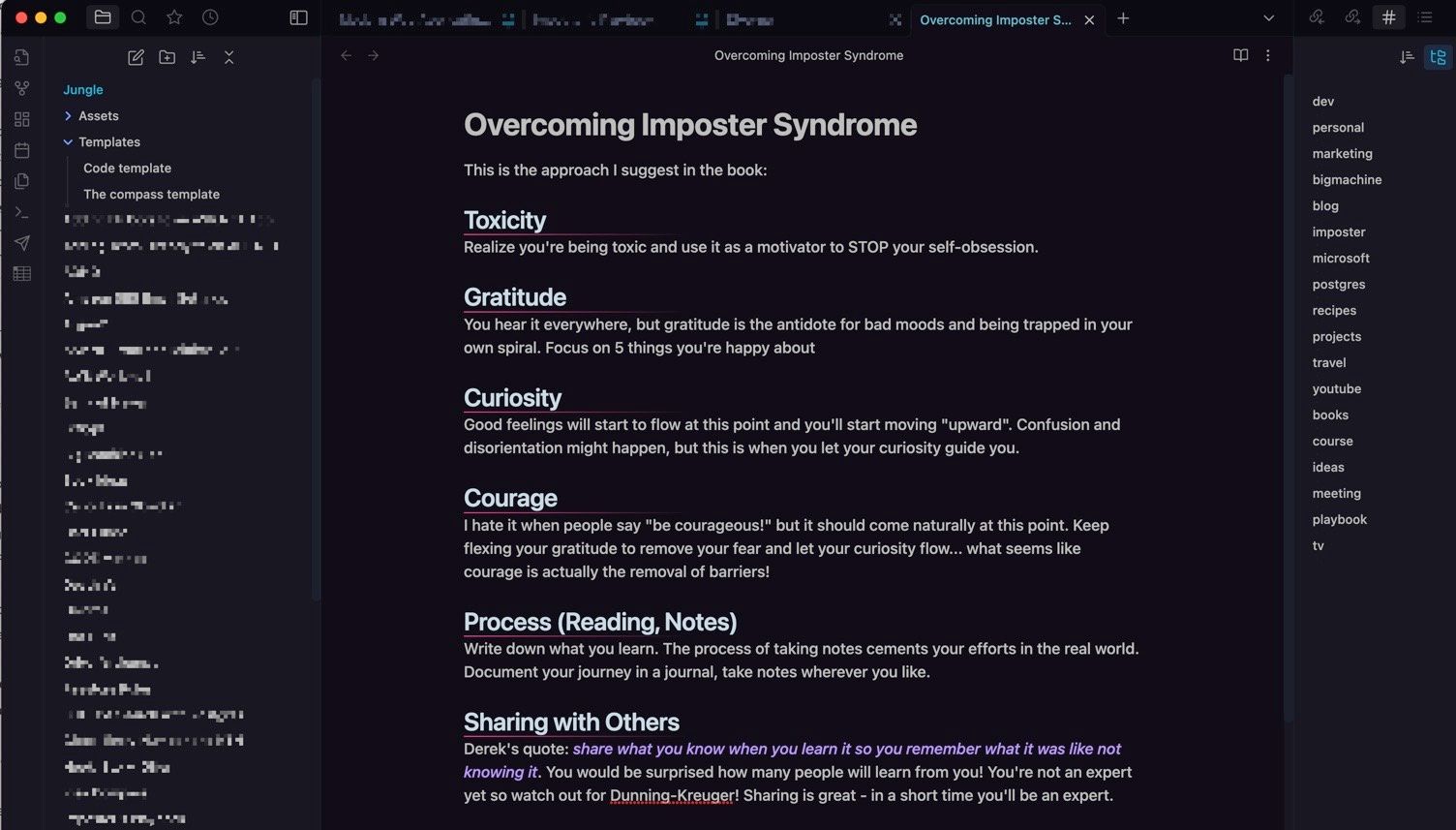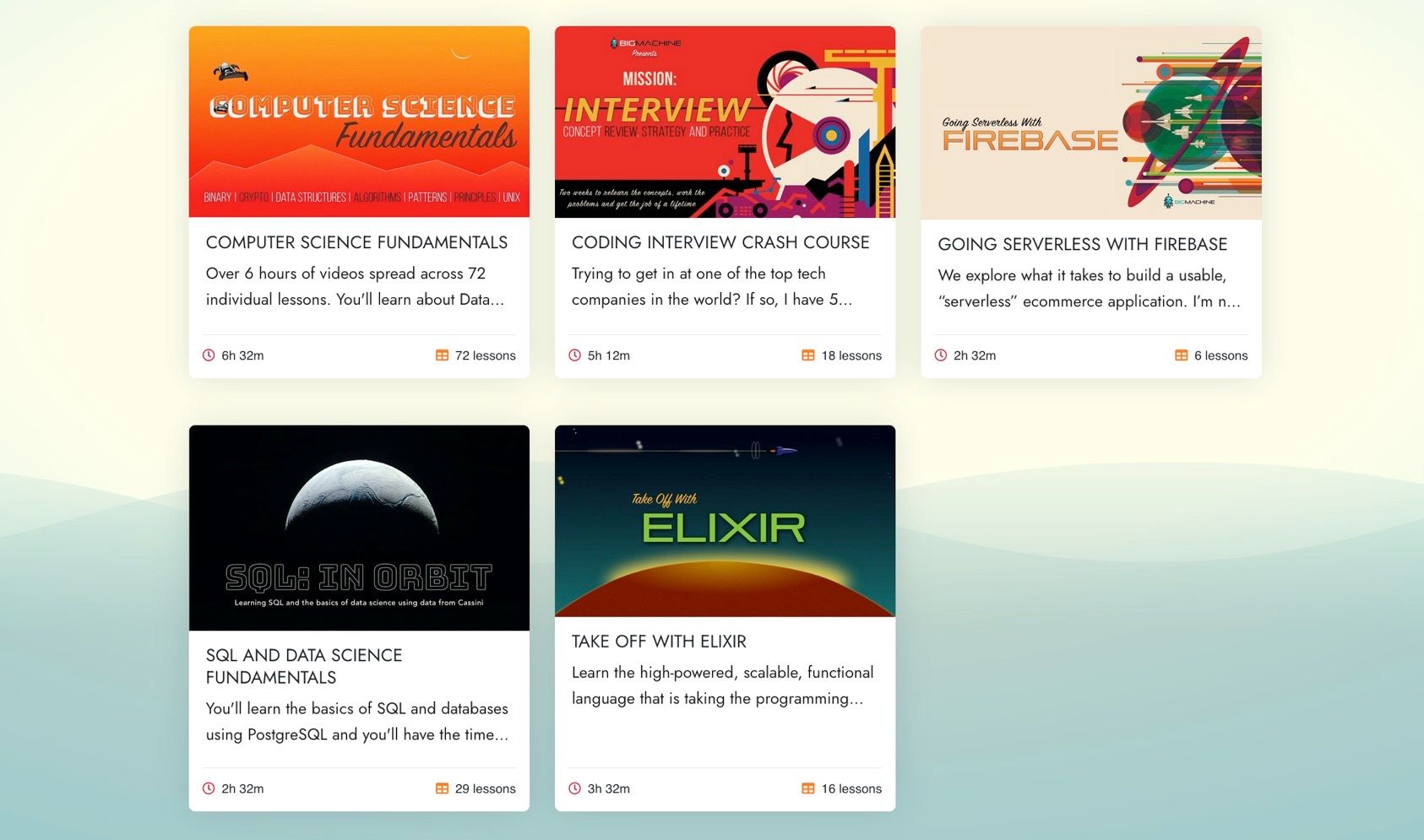I'm committing the cardinal sin of online digital marketing wonks: I'm still editing, refining and tweaking a book I released almost 7 years ago! You would think that I would move on by now... but... nope.
Here's my problem: I never addressed imposter syndrome directly in The Imposter's Handbook, which has the word imposter right in the damned title! This is a problem we've all felt, and I'm happy to say I've moved beyond it - but I never addressed just how I did that, until last night, when I added an entire section devoted to that problem.
So, here you go: Rob's seven step guide to getting past imposter syndrome and breaking out of a shitty cycle of self-loathing and defeat. Oh - and if you want to get the updated version you can download it right here. Just pop your email in and, if you've bought it already, I'll send you a link. If you haven't bought it yet, what the hell are you waiting for!
Let's Talk About Imposter Syndrome
You might feel perfectly at home in your job as a programmer, or you may feel that you’re fooling everyone and if you don’t act quickly you’ll be found out, canceled and your entire world blown to hell.
I used to feel this way. I hated it. Sometimes I find myself falling into the trap of “what the hell do you know, anyway? Who are you to be telling people about compilers and RSA encryption?”
Both of those are good questions that I think deserve and answer, but it all depends on how my inner voice decides to ask those questions.

My inner voice can be challenging.
With apologies to my Aussie friends out there - I really don’t think y’all are mean or anything. There’s just something… so… non-bullshitty about the Aussie twang. Like you know it’s telling you the brutal truth with a smile.
Anyway, I’m not a psychologist, believe it or not, but I have read a ton about emotional health and well-being over the years and I put a lot of what I read to work, and I would like to share that with you now.
Overcoming Imposter Syndrome
I took some time last year to lay out the steps I took to move beyond my imposter syndrome. At first I thought that it just naturally ebbed as I learned new things but nope, that’s not at all what happened.
What I found when I looked over my journal and notes from putting this book together (videos too) is a self-reinforcing cycle. I guess you could also call it a resonant cycle or just an upward spiral - but the idea is generally this: one good thing led to another, which pulled me out of the negative storm of imposter syndrome.
Sounds easy, right? “Just get over it and think positive!” I really hate advice like that but, at its core, this is basically what happened to me although it happened in much smaller steps, which I’ll share with you now.
I’ll start with a little splash of cold water that’s probably going to sting, but stay with me, it’s important.
Imposter Syndrome is Toxic
This is the stark truth. If you’re convinced that you don’t belong somewhere because you’re fooling someone, you are causing problems for others. It’s counterintuitive - how could you be causing problems if you see yourself as a problem?
The simple answer is this: people are generally nice and care about you. When you’re upset, they want to help. If you keep asking for help, they’ll keep helping and this will lead to a lopsided social dynamic that lopsidedly revolves around you. This will eventually cause problems.
Here’s a not-so-fun conversation along these lines:
Me: Wow, I am in so far over my head… I don’t know how I got hired here in the first place. I feel like studying for my interviews as hard as I did gave the entirely wrong impression of my skills.
Friend: they do this kind of thing every day Rob, I think they know when someone has talent and when they don’t. You’re fine, just focus on getting the work done.
Me: I’m hardly fine - they expect me to X and Y and somehow they think I know what I’m talking about. I really don’t!
Friend: didn’t you ship 2 applications last year with X and submit to PRs to the project, which were accepted?
Me: yeah well we all get lucky sometimes.
Friend: you sound like a broken record, get over it. You’ll do fine.
Me. But I really think that –
Friend: ROB. Seriously, you’re fine. Shut up.

One of the worst things in life is to have someone pile on the pain when you’re feeling exceptionally crappy. But when it comes to self-obsession (which imposter syndrome is), the only way out is through.
Thankfully, through, for us, simply means realizing what you’re doing and seeing it for what it is: a social problem.
Using Gratitude to Reverse The Suck
I’m sure you’ve heard this before: be grateful! Write down 5 things you’re grateful for and you’ll feel so much better! This never made sense to me. Give me a pint and I’ll feel better!
The truth is: it actually works. But you have to mean it and feel it, and really dig into the deep well of happy feelings that are already sitting inside of you. Believe me: I hate sounding like a guru-in-training but damn if it doesn't really work! I used to want to punch people in every one of their glowing chakras who would tell me to "think positive thoughts"... but when you really dig in and think about the things in life you love and are grateful for, well there's true power there.
I decided to take “grateful breaks” whenever I felt crappy about work, life, or my future. I learned to recognize these foul moods and give myself 7 minutes (don’t ask, it’s the way my brain works) to ponder the simple things that I am truly grateful for:
- Something comfortable I’m wearing, like clean socks or new shoes.
- My kid’s smile when she tells a funny joke.
- The fact that I get to write books like this which help people.
- The smell of freshly baked cookies.
- Chicken pot pies.
Yes, pretty mundane things to be grateful for, but that’s actually the point, believe it or not. We don’t spend enough time recognizing how fortunate we are, which is a powerful exercise.
The entire purpose here is to splash our insides with the golden glow of happy thoughts. Your goal should be to cause a true smile and if that smile comes from something work-related, even better.
You know how to code! That’s a pretty amazing skill, I think. Even better, you know how to type, which a lot of people can’t do! That means you also know how to read, which much of the world can’t. You were also able to buy this book, which makes you pretty well off.

Photo by Linus Nylund / Unsplash with text added by me
You get the idea. It’s so easy to forget the advantages we have, especially in our industry! The jobs, the creativity, the people we meet and the innovation!
Ride that wave, friendo! It’s a wonderful feeling and you can call it up any time you want, which is kind of a super power!
Unleashing Your Natural Curiosity
When your gratitude flows it causes positive feeling and thinking, which can unblock so many things locked up in your brain. That little voice that tells you you’re stupid or don’t belong tends to grow quieter as you give yourself permission to seek answers.
This can cause confusion and disorientation, which will cause our happy wave to collapse, but that’s OK! Being curious is so, so powerful and if you let it flow it will take you somewhere fun.
The trick is to let it be there and to give yourself the space to ask questions. I like to keep a list of things I’m curious about, along the lines of Richard Feynman’s 12 Favorite Problems:
You have to keep a dozen of your favorite problems constantly present in your mind, although by and large they will lay in a dormant state. Every time you hear a new trick or a new result, test it against each of your twelve problems to see whether it helps. Every once in a while, there will be a hit, and people will say, ‘How did he do it? He must be a genius!

Richard Feynman, from The Pleasure of Finding Things Out
I’ll talk more about writing things down in just a minute, as it’s a critical part of this process. The main thing I want to get across to you is that your curiosity is critical to propelling you forward from this point.
In fact, I hope you’re seeing that each step in this process builds on the previous! Stopping the negative spiral by seeing your toxicity is the start, and then reversing the process with gratitude is the second stage.
Using your natural curiosity as a fuel is the third (and very important) next step. Without this, it all falls apart.
Removing Obstacles with Courage
I’m sure you have a friend who’s told you to “just go out there and…” or “you just need to tell them how you feel” or maybe “you’ll be fine, you just need to learn to stand up for yourself.”
Feh.
This is easy advice and also easily useless. How do you just “become courageous”? After all, that’s what our friend is telling us when they say “just stand up for yourself”.
The answer, at least to me, is that you just need a good reason. We’ve all had those moments where we say or do something and surprise ourselves (for better or worse) so we just need to find one of those (a good reason).
But where?
I’ll give you one: you don’t want to lose this happy momentum. If you actually do the process I’m suggesting (toxic realization, gratitude, letting your curiosity out) you’ll start to feel a surge of happy creativity. If you stop now, it means descending back into the Pit of Sucky Self-obsession that no one wants to be around.
But here’s the thing: it’s doesn’t require a ton of courage to begin with, and it’s mostly dealing with just yourself. Your only task is to remove the stupid obstacles in your own mind that are stopping you from finding out.

My kid's active imagination
Your natural curiosity wants to know stuff! LET IT. You can trust yourself by courageously removing the blockers in your own head. I told myself that I wanted to learn all the things in the MIT CompSci curriculum and my inner voice instantly thought that was nuts! I had more important things to do, like finish my next video for Pluralsight (whom I was working for at the time).
My inner voice sounded something like this:
More videos, more money mate. Simple equation - now get back to work you daft twat!
Maybe this is why my inner voice sounds Australian to me (though this last was a bit more Birmingham) - I find it easier to laugh at and ignore.
Your instincts are there to guide and help you. You would be surprised at how often they can help you find something wonderful as opposed to fear, which almost always kick-starts the downward spiral into self-obsession and self-loathing.
The only way to know if your instincts are serving you is to actually let them do it. Give yourself the space to try something new or to go completely off the rails for a little bit, following your muse.
Fight the tendency to see this as permission to screw off all day - it’s not. You have a powerful pattern recognition machine behind your intelligent, reasoning mind that is exponentially more powerful. When you don’t give it exercise, it causes you problems.
Dr. Maxwell Maltz devoted an entire book to the idea that's one of my favorites. It has a goofy title, but a wonderful premise:
A human being always acts and feels and performs in accordance with what he imagines to be true about himself and his environment...For imagination sets the goal ‘picture’ which our automatic mechanism works on. We act, or fail to act, not because of ‘will,’ as is so commonly believed, but because of imagination.
You inner giant will go where it will, but you can gently guide it by feeding it with the good thoughts you're cultivating.
Journaling and Taking Notes
This process becomes real when you write it down. Having dreams and ideas is wonderful, but when you put it in ink and describe your goal, it becomes a commitment.
If you’ve given yourself permission to go where your curiosity takes you, document the journey. I cannot stress this enough! I use both a journal and a note-taking app and they have been absolutely critical to this process.
In fact, when I’m feeling doubtful or my inner voice is getting the better of me, I’ll write myself little bits of encouragement. The best are my stick figure doodle friends that tell me I’m OK and doing good stuff.
If you haven’t journaled before, I would encourage you to have a look on YouTube and watch a few videos on Bullet Journals. You’ll be awash in people showing off how beautiful their illustrations are, but that’s kind of the point. Creating a beautiful space for your mind to wander and feel settled. I can’t draw worth a damn but I keep trying! There’s no judgement in there and I like it when something actually does come together and look nice.

For notes, I use Obsidian and I love it. There are loads of apps and also loads of processes for using these apps and I’ll leave that to you to figure out what works best.
I filter the notes I take, writing down only the things that “stick” or resonate in my head. I go back and look through them from time to time, and when they relate it gets magical!

My notes for this post
Anyway: get the stuff out of your head and on paper somehow so you can see your progress and feel the reality of it. It really does fill your soul!
Sharing With Others
If you’ve made it this far in your journey, hopefully you’re finding each step getting easier. The momentum you build in your upward journey reinforces itself, in the same way imposter syndrome reinforces itself through _negative_resonance.
Good news friendo: it only gets better from here. If you’ve unleashed your curiosity, removed obstacles courageously AND have documented your journey, you’re ready to share!
This might be hard to read if you’re still in the grips of imposter syndrome, but believe me, it’s so, so wonderful!
Sharing what you’ve learned is a wonderful gift.
You might think: “who, me? What do I know? I’m no expert on X, why in the world would I tell anyone else about it!” I think these concerns are valid, especially in the hyper-stupid world of stupid stupid social stupidity where everyone shares everything and it can be extraordinarily … stupid.
That’s not what I’m talking about. Consider this quote from my friend Derek Sivers:
You should share something you’ve learned right when you learn it so you remember what not knowing it was like.
I so, so love that. Look: I’m not a psychologist or spiritual guru. I’m not a consciousness expert or therapist of any kind, yet here I am, sharing a profoundly personal experience with you that changed my life. I don’t need to be an expert to share this!
I don't have a degree in Computer Science and I've failed more job interviews than I can count (and succeeded too!) - but that doesn't mean I can't share what I've learned with you. In fact, I might say it puts me in a unique position because I've learned what failure looks like - success too.
Video courses I've made over the years
That’s the key: you’ve taken the time to discover and learn something, fueled by curiosity and courage. You’ve written down what you’ve learned and considered it at length. You’ve learned something.
Boom. Share it with others and change someone’s life. How fun is that! The trick, here, is not to tell someone what to do but, instead, share with them how you see the problem, the solutions you considered, the ways in which you failed, and what ultimately worked for you. Invite feedback and discussion - and everyone wins.
Now it goes without saying that there are ego traps here. It’s easy to figure something out and have someone refer to you as an expert, which is never fun. Someone once called me an expert on imposter syndrome and I think I screamed something horrible.
People that do fall into this ego trap become Expert Beginners, the poster children of Dunning-Kruger syndrome. It’s human, I suppose, but do be aware of these traps. Becoming an expert at anything takes a lot of experience, which means a lot of failures, and that doesn’t happen quickly.
Take your time getting to the top of the mountain but, remember, the true joy is in the climb.
The Final Step: Recognition
So here we are. You’ve reversed that horrible, toxic imposter nonsense and you’ve pulled yourself up, learning amazing things and setting up plans for a brighter career!
That’s the goal, anyway. It does take time, which is where this book comes in.
My goal is to wedge this book in right above the second stage gratitude. I can’t stop you from being toxic, you need to do that yourself. I also can’t help you with becoming curious, that’s something only you can do.
I can fire that curiosity, however, and that’s my plan.
I want to help push you along the wonderful course your career is about to take. You just need to supply the courage, notes and, hopefully, the sharing. If you do these things, I just have one request: stop and notice.
At some point good things will start happening to you professionally, It’s a good practice to recognize these things by writing them down or celebrating with friends and family. It could be as simple as getting a promotion or as dramatic as having the courage to leave that dead-end job.
Maybe you finally understand P vs. NP (that took me a while!) The point is: recognize and be grateful for how far you’ve come.
Yes, there’s that word again: grateful. You’ll find it’s akin to pure magic when it comes to transforming yourself and your work. What’s even better is that the people around you will feel it too, and everyone benefits.
Right then! Hopefully you feel mentally prepared because WOW do we have some fun things to learn. Get yourself to stage two, friendo, and let the curiosity flow because we’re going to hit the ground running.
Here we go…

Photo by Gian Luca Pilia / Unsplash

